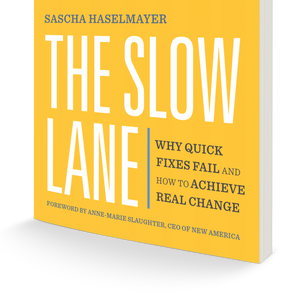On Tuesday, LSE Cities convened about a hundred people to launch my book, and talk about The Slow Lane. As Dr. Julia King, one of the panelists, put it, “The Slow Lane is a promising form of city making… because it is willing to get tangled up in the laws and politics of everyday life.” Cities have, of course, been my lifeblood for many years. So, what other ideas and questions for a Slow Lane City, did these experts come up with?
Let me start by saying, if you want to go deep into this conversation, I recommend that you watch the recording of the event. Otherwise, I will pull out some highlights in this post, below, grouped by the three panelists.
Ricky Burdett (@burdettr), a Professor of Urban Studies and the Director of LSE Cities, chaired the event and reflected that The Slow Lane, to him, is about a different mindset to help us face the big and urgent challenges of our time, like climate change and inequality. There is something very natural about the idea of slowness, much as slow food is to his native Italy.
After reading The Slow Lane, Tessy Britton wants to bring more young people on this journey. And learn to be joyful about the fact that the next generation will finish this work.
Tessy Britton (@tessybritton) is a social designer based in Edinburgh and an Ashoka Fellow. She is the Founder of an extraordinary organization, Participatory City, where she was Chief Executive until 2021. Tessy is dedicated to designing social infrastructure for social cohesion, by creating new ways of making our everyday lives more inclusive, creative and circular. Tessy describes her work like this: “We provide the agency for people who have been sidelined. We’ve constructed neighborhood participation for the most confident and time-rich, and then we are surprised that they are the only people who turn up. We created a way that values everybody’s contribution, whether that’s just an hour or half-an hour. Giving agency to everyday people has driven our work.”
Facing Up To The Long Haul
Tessy's main take-away from The Slow Lane was that important change takes a long time. Decades. And that this realization really changed the way she is thinking. She feels a deep sense of urgency, faced with inequalities, climate migration, conflict. The Slow Lane has helped her reframe her thinking, especially, as she thinks about how many years she has left to do this work. If we are honest and take this long view, the work she has started, will be finished by other people. This reframes the work she is currently doing: After reading The Slow Lane, she wants to bring more young people on this journey. And learn to be joyful about the fact that the next generation will finish this work.
Slow Lane Leadership
Tessy sees that a lot of The Slow Lane is about leadership. You don’t think about leadership, until there is none. Someone has to hold this change. And over the long time frames that real change demands, many public leaders are tempted to cut off the legacy left by the leader before them, to leave their own, distinct mark. Holding on to other people’s legacy, then, is also an act of great Slow Lane leadership. For her, a great example of such multi-generational leadership started with a decision by the president of Costa Rica, in the 1940s, to close down the military and give all the funding to the department of education. Then, 40 years later, the president in 1987 said the following: “In my homeland you will not a single tank or warship. Today we threaten no one, neither our own people nor our neighbors. Such threats are absent not because we lack tanks, but because few of us are illiterate or unemployed.” Carrying forward the legacy of transformative, slow change, is a real act of courage and great leadership.
A Book To Help Communities
For Tessy, The Slow Lane is a book that she hopes will be read and used by many. Not least to help communities and everyone contributing to real change, to have a more nuanced and intentional view of when to go fast, or slow.
For Julia King, The Slow Lane offers a practice of city-making that is promising not just because it offers better infrastructure, but because it is a practice willing to get tangled up in the laws and politics of everyday life.
Dr Julia King (@atjuliaking) is a Policy Fellow at LSE Cities and a design practitioner. Trained as an architect her research, design practice, and teaching focus on urban marginalization, infrastructure, and micro-economies. She is the director of the ‘Apprenticeship Programme in City Design’ and ‘Researcher in Residence’ scheme at LSE Cities. She has won numerous awards for her work, most recently the Eurocities Award for Seen and Heard, a project involving 15 to 25-year olds in the design and management of their local public space in the London borough of Brent.
Incrementalism in The Slow Lane
Julia herself is Venezuelan, her mother lives in Caracas. That's why she was drawn to the story about how Catuche took a distinct path, for over 30 years, that is strongly defined by self-determination. The people of Caracas very much live in the Slow Lane: Everything there is a slow work in progress. Without functioning systems, everything has to be done through slow and steady incrementalism. A water vendor may collect water from a formal source, and then distribute it informally to people who need it. Taken together, it amounts to building complex change through highly localized systems. To Julia, the story of Catuche is about incrementalism, underpinned by the five principles of The Slow Lane. And this way of operating allows for this kind of experimentation that has allowed Catuche to survive the absolute devastation of Venezuela over the past decades. By incrementalism, Julia means the small extensions of human agency, that ultimately stitch together into something bigger.
Co-Production, And Its Critics
For architects, Catuche is a story of co-production, the provision of public services assembled out of contributions by the state and ordinary citizens. Elinor Ostrom, the first of just two women to win the Nobel Prize in economics, introduced this concept of co-production. It highlights the institutional creativity of informal groups and private citizens that is meant to compensate for service delivery and planning by the state.
Julia highlighted two common critiques of the concept of co-production. The first is that some people consider co-production ineffective in practice because, to function, it requires the state and private sector to value community-driven approaches and local entrepreneurialism. That's rarely the case. So, whilst The Slow Lane describes cases where co-production works, it doesn't work in many other cases. The second is that some see this kind of co-production as a neoliberal construct, designed to achieve affordability by utilizing the poorest of the poor without actually involving or empowering along the entire policy, delivery, operation, and maintenance continuum. In short, whilst co-production can be an effective way to transform a system or build resilience, as The Slow Lane rightly shows, it can also fail to gain traction or be outright cynical in other contexts.
Calling Us To Stay As Long As It Takes
Julia pointed out that urbanization, the movement of large numbers of people into cities, is both the world’s most pervasive challenge and its greates opportunity. If done in the Slow Lane way, cities become engines of growth, opportunity and social change – and the fastest way out of poverty. But we do have the city paradox: Cities are some of the most unequal places in the world, and urban inequality is, today, higher than in the 1920s. Cities are slow and fast all at the same time, what I call “the human mess”. And that makes it so difficult to work with them. The Slow Lane offers a practice of city-making that is promising. Not just because it offers better infrastructure, but because it is a practice willing to get tangled up in the laws and politics of everyday life. She quotes from the book, “Catuche taught me that we need to do more than slowing down a bit here and there. We need to stay for as long as it takes.” Catuche is not a project.
A Book To Find Your Agency
Julia thinks the The Slow Lane can be very successful in offering an approach to individuals in many fields. She read it as an architect, and the agency I can have operating in my field. The same will apply to professionals in many other fields. The advanced way of reading The Slow Lane is how individual agency can change institutional agency, and the steps to change things. In that way, it can also be read as a provocative book questioning how an individual operates as part of a larger system or institution, like this university.
Want to help The Slow Lane? Here is how.



